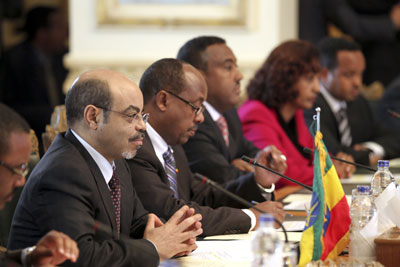Three years ago, I met Minister Bereket Simon at his office at the center of Addis Ababa. I was with my colleague Abiye Teklemariam — who was recently charged with terrorism, treason and espionage along with five other journalists, including myself.
Our purpose in meeting Bereket was to make our position clear regarding the government’s wasteful animosity toward us, and express our concerns surrounding press freedom in Ethiopia.
MORE ON THIS ISSUE
• Report: Journalist
jailings jump
• Database of all
imprisoned journalists
• Blog: China’s crackdown
on ethnic journalists
The period was a tense and confrontational one for staff members of our newspaper, Addis Neger. Many observers had begun to predict the imminent closure of Addis Neger and our inevitable arrest. As became evident later, the government was suspicious of us and had already decided our fate. Of what were they suspicious? That depends on whether you want the public version of their suspicion, or the other version, relating to politics and power. The public version is a cover up for the latter version.
The biggest worry for any autocrat stems from individuals and institutions that appear to be independent and attractive to one or more sections of society. The Ethiopian government’s real suspicion — more appropriate to call it fear — was that Addis Neger or people gathering around its ideals could be turned into a political force. This may have taken different forms, the government assumed — including forming a new political party as a solid group; joining one of the oppositions; endorsing or actively supporting opposition parties; or challenging the legitimacy of the regime by forming critical opinions.
No intelligent leader can declare this panic in public. The creative capacity of any autocrat reveals itself in his ability to formulate a public suspicion that can conceal the primary concern, which is to stay in power.
Bereket is the right-hand man of Ethiopian Prime Minister Meles Zenawi, and has handled the government’s media affairs for 20 years. In our meeting with him, we highlighted the public’s fear of a sudden and blanket closure of independent newspapers, as had happened in 2005. Bereket was articulate in addressing our concern: “Have no worry about that; we won’t repeat that kind of measure. Instead, the government is determined to handle both the media and journalists using democratic instruments.”
By “democratic instruments,” Bereket meant laws and government organs – each being an appendix of the ruling party. Instead of closing a newspaper by ordering the printing house not to print, the law made the printer responsible for the content of what he is printing. Instead of telling reporters to stop writing about a particular political group or view, such reporting is criminalized by the outlawing of the party (as well as any discussion regarding its view). The government no more issues an order to arrest activists or close an independent NGO working to empower citizens or expose human rights abuses. It simply makes life impossible for such groups by requiring them by law to cover 90% of their budget from local sources.
Thus, the public suspicion is aimed at sensitizing the public, or at least ruling party members, about the legal action the government is going to take using “democratic instruments.” It is often based on fabricated or half-baked conspiracy plots. Some of the allegations against independent newspapers and journalists in Ethiopia paint them as dangerous elements posing a threat to the country: the agents of foreign forces or enemy states; operatives of the CIA; members or supporters of opposition or extremist groups; advocates of anti-ethnic or religious groups; advocates of anti-state ideas, and more.
Such allegations are used the world over to silence and intimidate independent voices. Such instruments are used to jail journalists, not just by the Ethiopian government but also by the worst offenders, the governments of Iran and China.
When my colleague Abiye and I met with Bereket, we were bold enough to explain our fundamental positions as an independent media institution and responsible journalists. He was also honest enough to admit the government’s fear, saying, “You have a political agenda.” What does this mean, where anything from an editorial to a cartoon can be considered political and entail an agenda?
Today, my colleague, journalist and blogger Eskinder Nega, has been imprisoned since September 14 in Maekelawi Federal Detention Center. Note that the government is holding him using a “democratic instrument” called the “Anti-Terrorism Law.” The same instrument put journalists Woubshet Taye and Re’eyot Alemu behind bars. The two Swedish journalists, Johan Persson and Martin Schibbye, are also in prison defending their professional activities, which are criminalized in Ethiopia.
